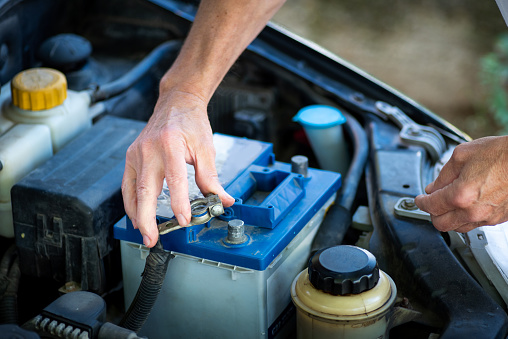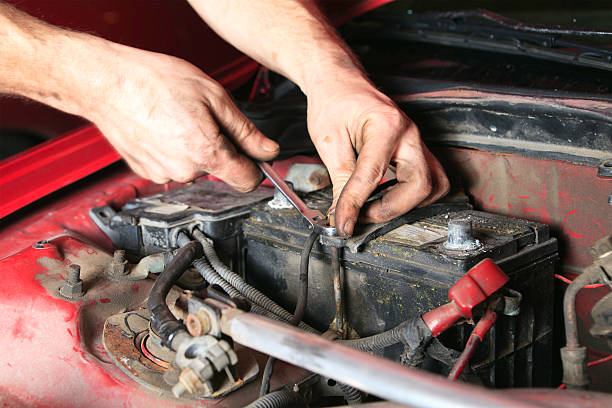December 25, 2024
Signs Your Car Battery Has To Be Replaced
There are several signs that your car battery may need to be replaced. Here are some common signs to look out for:
- Slow engine crank: If your engine cranks slowly when you turn the key, it could be a sign that your battery is weak and needs to be replaced.
- Dim headlights: If your headlights are not as bright as they used to be, it could be a sign that your battery is losing power.
- Electrical issues: If you are experiencing electrical issues with your car, such as the radio or power windows not working properly, it could be a sign that your battery is weak.
- Swollen or bloated battery case: If you notice that the battery case is swollen or bloated, it could be a sign that the battery is overheating and needs to be replaced.
- Bad smell: If you notice a rotten egg or sulfur-like smell coming from your car, it could be a sign that your battery is leaking gas and needs to be replaced.
- Old age: Car batteries typically last 3-5 years, so if your battery is approaching this age, it may be time to replace it before it dies completely.
If you are experiencing any of these signs, it is important to have your battery checked by a professional as soon as possible to avoid any potential breakdowns or damage to your car’s electrical system.
Slow engine crank
A slow engine crank can be caused by a number of factors. Here are some common reasons for a slow engine crank:
- Weak battery: If your battery is weak or dead, it may not provide enough power to turn the engine over at the necessary speed. You can test your battery using a multimeter or take it to a mechanic for a battery test.
- Faulty starter: A faulty starter can also cause a slow engine crank. If the starter motor is not functioning properly, it may struggle to turn the engine over. A mechanic can test the starter motor to see if it needs to be replaced.
- Loose or corroded battery connections: If the battery connections are loose or corroded, it may not provide enough power to start the engine. Make sure the battery terminals are clean and tight.
- Alternator problems: If the alternator is not charging the battery properly, it may not have enough power to start the engine. A mechanic can test the alternator to see if it needs to be replaced.
- Cold weather: In cold weather, the engine oil can become thicker, making it harder for the engine to turn over. You may want to consider using a thinner oil in cold weather.
If you are experiencing a slow engine crank, it is best to have it checked by a mechanic to determine the exact cause and prevent further damage to your vehicle.
Dim headlights
Dim headlights can be a safety hazard while driving at night or in low light conditions. Here are some common reasons why headlights may appear dim:
- Dirty headlights: Over time, dirt and grime can build up on the headlights, reducing the amount of light that is emitted. Make sure to clean the headlights regularly to keep them clear.
- Bad bulbs: If the headlights are not functioning properly, it could be due to a bad bulb. You can check the bulbs by visually inspecting them or by using a multimeter to test the electrical connection.
- Low voltage: If the voltage is low in the car’s electrical system, it may cause the headlights to appear dim. This could be due to a weak battery, bad alternator, or loose electrical connections.
- Poor grounding: If the headlights are not grounded properly, it can cause them to appear dim. Check the grounding wire for corrosion or damage.
- Faulty headlight switch: If the headlight switch is not working properly, it may cause the headlights to appear dim. A mechanic can test the switch to see if it needs to be replaced.
If you are experiencing dim headlights, it is important to have them checked by a mechanic to ensure they are functioning properly and to prevent any potential safety hazards while driving.
Loose or corroded battery connections

Symptoms of Loose or Corroded Connections
- Difficulty Starting: Engine cranks slowly or fails to start.
- Dim Lights: Headlights or interior lights are dimmer than usual.
- Electrical Issues: Erratic performance of accessories (radio, power windows, etc.).
- Battery Warning Light: Dashboard warning light may appear.
- Clicking Noise: Clicking sound when turning the ignition.
- Visible Corrosion: White, blue, or green powdery buildup around terminals.
Causes
- Loose Connections: Over time, vibrations can loosen the battery terminals.
- Corrosion: Acid leakage, exposure to moisture, or aging can cause buildup on the terminals.
- Wear and Tear: Terminals or clamps can degrade due to repeated tightening or environmental exposure.
Solutions
1. Inspect the Battery
- Check for visible corrosion or loose cables.
- Look for any cracks or damage on the battery casing.
2. Clean the Terminals
- Materials Needed:
- Protective gloves and safety goggles.
- Wire brush or terminal cleaner.
- Baking soda and water solution.
- A small brush or toothbrush.
- Clean rag or paper towel.
- Steps:
- Disconnect the battery (negative terminal first, then positive).
- Mix a tablespoon of baking soda with water to form a paste.
- Apply the paste to the terminals and scrub with the brush.
- Rinse with clean water and dry thoroughly.
3. Tighten Connections
- Ensure the terminals are securely clamped to the battery posts. Avoid overtightening to prevent damage.
4. Use Anti-Corrosion Products
- Apply dielectric grease or anti-corrosion spray to terminals to prevent future buildup.
5. Replace Worn Components
- If cables, clamps, or the battery itself show significant wear, replace them.
Preventive Measures
- Regularly check the battery and connections for signs of wear or buildup.
- Secure the battery properly to minimize vibrations.
- Inspect the charging system to ensure the alternator is functioning correctly.
If problems persist, it may indicate a deeper issue with the battery or electrical system that warrants professional inspection.
Bad smell
A bad smell in your car can be unpleasant and may indicate a problem with your car’s systems or components. Here are some common causes of bad smells in cars and what you can do to fix them:
- Mold or mildew: If your car has a damp, musty smell, it may be due to mold or mildew growth in the carpet, upholstery, or air conditioning system. Clean and dry any damp areas and use a mold and mildew remover to eliminate the odor.
- Fuel or exhaust odor: A fuel or exhaust odor may indicate a problem with the fuel system or exhaust system. Have a mechanic inspect these systems to determine the cause of the odor.
- Burning smell: A burning smell may indicate an overheating engine, a malfunctioning electrical component, or a problem with the brakes. Stop driving the car immediately and have it inspected by a mechanic.
- Spilled food or drink: If you spilled food or drink in your car, it may cause a bad odor. Clean up any spills immediately and use an odor eliminator to get rid of the smell.
- Dead animal: If there is a foul smell in your car that won’t go away, it may be due to a dead animal, such as a rodent, that has gotten trapped in your car’s systems. Have a mechanic inspect your car to locate and remove the animal.
If you are experiencing a bad smell in your car and you cannot determine the cause, it’s best to have a mechanic take a look. They can identify the source of the odor and recommend the appropriate solution.

